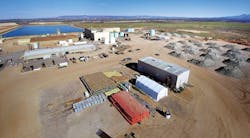Rare earth elements producer Energy Fuels has received a contract to sell $18.5 million of natural uranium concentrates (U3O8) to the U.S. government to establish a strategic uranium reserve.
The sale of uranium to the U.S. National Nuclear Security Administration (NNSA) is expected to be completed during the first quarter of 2023. The U.S.-origin U3O8 will be supplied from the company’s Metropolis Works Conversion Facility in Metropolis, Illinois. The sale does not involve the physical movement of material.
NNSA is an agency within the U.S. Department of Energy (DOE) that is tasked with buying domestic U3O8 and conversion services for the uranium reserve, which will serve as a backup source of supply for domestic nuclear power plants in the event of a significant market disruption.
"Russia's invasion of Ukraine has highlighted America's troubling dependence on Russia and its allies for our nuclear fuel and uranium supply, and the need for the U.S. to rebuild its uranium and nuclear fuel capabilities," Mark S. Chalmers, President and CEO of Energy Fuels, stated. "Today, nuclear energy provides the U.S. with roughly 20% of all electricity, and 50% of our clean, carbon-free electricity. U.S. and European nuclear industries are actively working to shift away from Russian uranium supply, but the process will be difficult and lengthy.
More Nuclear stories from EnergyTech
Idaho National Lab partnering with LightBridge on Nuclear Fuel R&D
Steel and Mining firm ArcelorMittal investing $25M in next-gen Nuclear
“The U.S. can rely on supply from allies like Canada, Australia and others for a large proportion of our uranium and nuclear fuel supply, but we must also restore our own capabilities. For the past several years, U.S. uranium production has been near-zero and our only uranium conversion facility has been shut-down. The uranium reserve is a small, but important, step toward resolving this untenable situation."
The company has also applied for a membership in the newly created HALEU Consortium, a program managed by the DOE's office of Nuclear Energy. The program is designed to help create a secure domestic supply of high-assay, low-enriched uranium used by many next-generation advanced nuclear reactor technologies.
Energy Fuels is the largest producer of U3O8 and the owner and operator of the only conventional uranium mill in the U.S (see art of White Mesa, above). The company is also pursuing other DOE priorities related to uranium production, including medical isotope production and rare earth element.
The U.S. DOE also has secured a uranium concentrates contract with Peninsula Energy, which owns projects in Wyoming. Peninsula's subsidiary Strata Energy will supply 300,000 pounds of U308.





